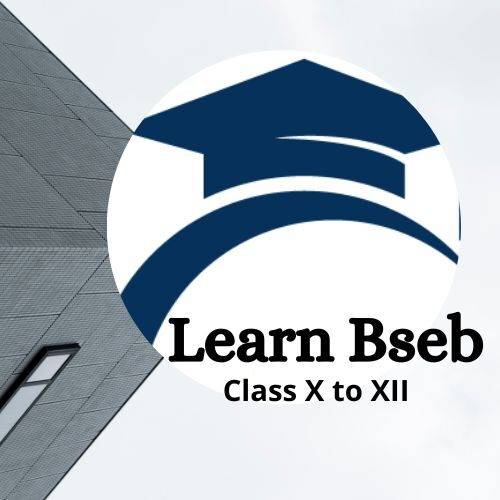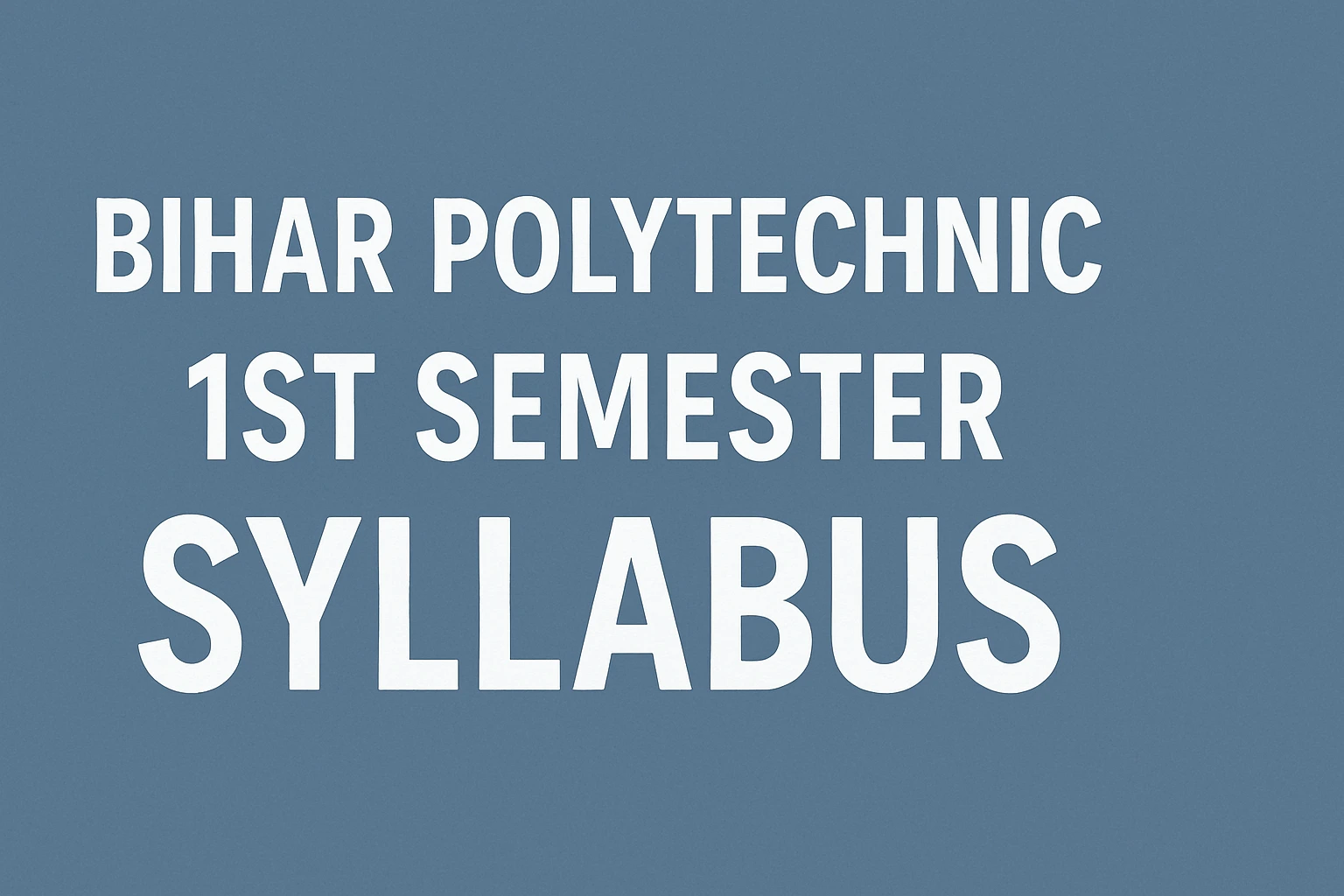Bihar Polytechnic 1st Semester Syllabus: A Thorough Observation For Beginners
Is it your goal to get a diploma in engineering from Bihar Polytechnic? It is highly recommended that you familiarise yourself with the Bihar Polytechnic 1st semester syllabus, as it will aid in determining how well you perform in your academics. No matter if you have taken mechanical, civil, electrical, or any other engineering branch, the first semester is meant to strengthen the engineering fundamentals. This blog will cover the entire Bihar Polytechnic 1st semester syllabus along with other important subjects, essential topics, examination patterns, and preparation guidance through which you can ace the semester.
Introductory Overview Of Bihar Polytechnic
As it has been mentioned before, the polytechnic diploma admission entrance exam is called the DCECE (Diploma Certificate Entrance Competitive Examination), which is conducted by BCECEB (Bihar Combined Entrance Examination Board). After passing the entrance exam, candidates become eligible to enroll in different engineering and non-engineering diploma programs in the government and private polytechnic colleges in Bihar.
For students who gain admission, classes commence from semester one, which contains general subjects applicable to all branches and level basics of the individual’s selected stream. Now we will examine the Bihar Polytechnic 1st semester syllabus in depth.
Overview of Bihar Polytechnic 1st Semester Syllabus
The 1st semester syllabus in Bihar Polytechnic is generally common across most engineering branches, such as:
- Mechanical Engineering
- Civil Engineering
- Electrical Engineering
- Electronics Engineering
- Computer Science Engineering
The focus is on basic sciences, communication, mathematics, and workshop practices to help students build a solid technical base.
Common Subjects in Bihar Polytechnic 1st Semester
- Engineering Mathematics—I
- Algebra
- Trigonometry
- Coordinate Geometry
- Calculus (Differentiation and Integration basics)
- Matrices and Determinants
Objective: To improve analytical and problem-solving skills.
- Engineering Physics—I
- Units and Measurements
- Kinematics and Dynamics
- Laws of Motion
- Work, Power, and Energy
- Thermodynamics (Basic Concepts)
- Properties of Matter
Objective: To develop a strong understanding of physical principles in engineering.
- Engineering Chemistry
- Atomic Structure
- Chemical Bonding
- Electrochemistry
- Acids and Bases
- Corrosion and Its Prevention
- Lubricants and Fuels
Objective: To learn the chemical behaviour of materials used in industry and engineering.
- Engineering Drawing / Graphics
- Introduction to Technical Drawing
- Types of Lines and Symbols
- Orthographic and Isometric Projections
- Scale Drawing
- Geometric Constructions
Objective: To understand and communicate engineering ideas through drawings.
- Basic Workshop Practice
- Fitting Shop
- Carpentry Shop
- Welding Shop
- Electrical Wiring and Soldering
- Sheet Metal Work
Objective: To develop practical skills and familiarity with basic engineering tools.
- English Communication Skills
- Grammar and Vocabulary
- Reading Comprehension
- Writing Skills (Letters, Essays, Applications)
- Speaking and Listening Activities
Objective: To improve communication skills for technical and workplace interactions.
Subject-wise Syllabus Breakdown
🔹 Engineering Mathematics—I (Detailed Topics)
- Set theory and relations
- Complex numbers
- Logarithms and indices
- Linear equations and quadratic equations
- Binomial theorem
- Trigonometric ratios and identities
- Heights and distances
- Basic differentiation and its applications
- Introduction to integration
🔹 Engineering Physics—I (Detailed Topics)
- Scalars and vectors
- Newton’s laws of motion
- Circular motion
- Work and energy conservation
- Heat and temperature
- Expansion of solids, liquids, and gases
- Mechanical properties of matter
- Basics of acoustics and wave motion
🔹 Engineering Chemistry (Detailed Topics)
- Periodic table and periodicity
- Chemical bonding and molecular structure
- Electrolytes and non-electrolytes
- pH and buffer solutions
- Types and properties of fuels (coal, petrol, diesel)
- Water treatment methods
- Alloys and their properties
- Corrosion: types and prevention techniques
🔹 Engineering Drawing / Graphics (Detailed Topics)
- Drawing instruments and their use
- Practice of lines, lettering, and dimensioning
- Principles of projection
- Orthographic projection of points, lines, and planes
- Isometric projection and views
- Development of surfaces
- Sectional views of solids
🔹 Workshop Practice (Shops and Tasks)
- Fitting: Filing, drilling, and fitting jobs
- Carpentry: Sawing, planing, and wood joint making
- Welding: Arc welding practice
- Sheet Metal: Cutting and Bending
- Electrical: Wiring circuits, repairing fuses
Safety training and tool handling are key parts of this subject.
🔹 English Communication (Detailed Topics)
- Parts of speech and sentence formation
- Tenses, subject-verb agreement
- Reported speech and active/passive voice
- Vocabulary building and spelling
- Letter writing: formal and informal
- Dialogue writing and conversation practice
- Listening comprehension
- Public speaking exercises
Internal Assessment and Exam Pattern
| Component | Marks |
|---|---|
| Internal Assessment | 20–30 |
| Practical/Sessional | 25–40 |
| External Theory Exam | 70–80 |
| Total | 100 per subject |
Passing Criteria: Minimum 40% in each subject and 50% overall.
📚 Recommended Books and Study Materials
- Engineering Mathematics by B.S. Grewal
- Engineering Physics by H.K. Malik and A.K. Singh
- Engineering Chemistry by Jain & Jain
- Engineering Drawing by N.D. Bhatt
- Workshop Technology by R.K. Jain
- English Grammar in Use by Raymond Murphy
It is also suggested that students go through the NCERT textbooks for Class 11 for the basics of Physics and Chemistry.
Tips to Succeed in the 1st Semester
- Make Sure All Classes Are Attended
- Hands-on Practising Engineering Drawing
- Strengthen Basic Math
- Group Study
- Focus On The Practicals
- Improve Communication Skills
- Work on better balance between theory and practicals
Conclusion
The syllabus of Bihar Polytechnic 1st semester serves as a systematic basis for every engineering diploma student. Mastering the common subjects in the first semester will facilitate comprehension of more advanced topics in later semesters. With smart preparation, class attendance, practice, and a sense of curiosity, students can achieve remarkable results that will help them move toward a prosperous engineering career.
As a prospective student, irrespective of your preferred branch of study - mechanical, civil, or any other - this is the semester that sets the tone for the rest of your journey, so utilise it wisely!
Frequently Asked Questions (FAQS)
Q1. Is the 1st semester syllabus the same for all branches?
Yes, most subjects in the 1st semester are common across branches in Bihar Polytechnic.
Q2. What are the passing marks for each subject?
You must secure at least 40% in each subject and 50% overall to pass.
Q3. Are there any language subjects in the 1st semester?
Yes, English Communication is included to improve speaking and writing skills.
Q4. Are practicals compulsory?
Yes, practical exams are mandatory and form part of your internal assessment.

